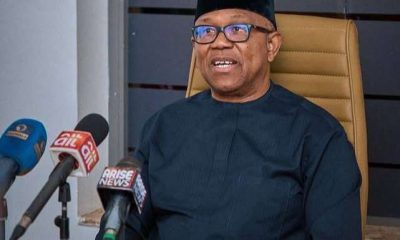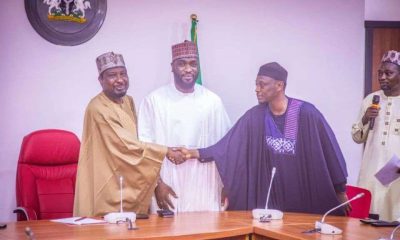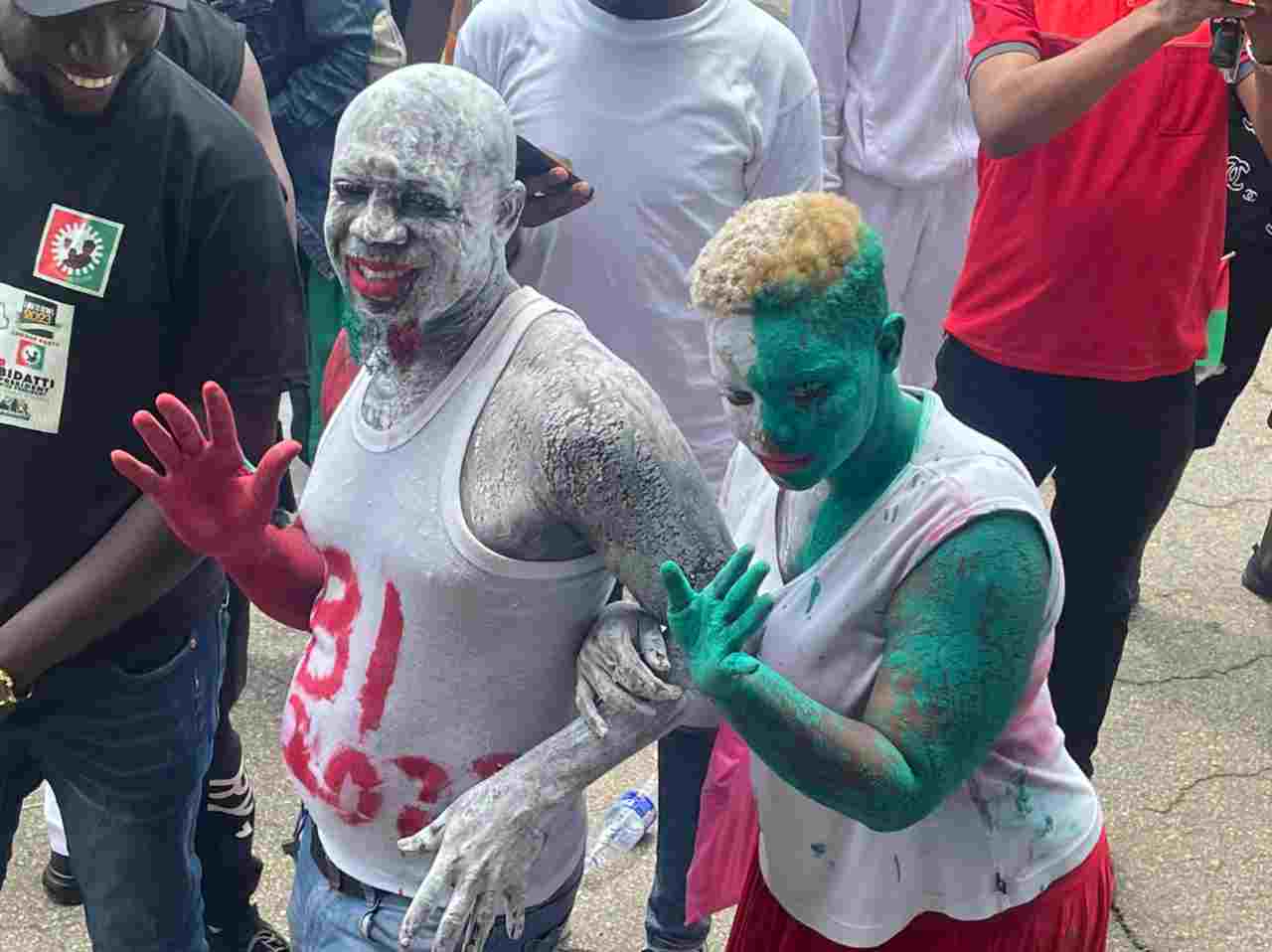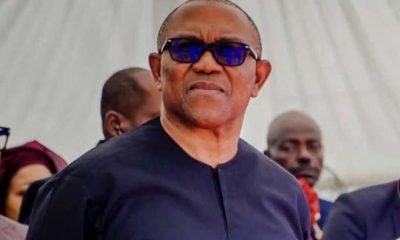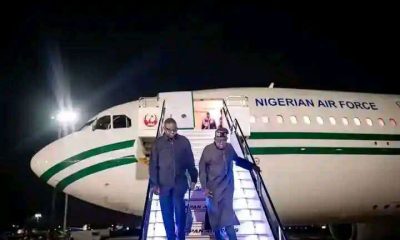Politics
2027: ADC coalition raises hope of change

• Nigerians warn of personal ambition of leaders
A political storm is brewing in Nigeria as key opposition leaders rally under the banner of the African Democratic Congress (ADC), signalling what could become a defining showdown ahead of the 2027 general election.
This unlikely convergence of political heavyweights – including former Vice President Atiku Abubakar, ex-Labour Party (LP) presidential candidate, Peter Obi, and ex-Kaduna State governor, Nasir El-Rufai – marks the formal adoption of the ADC as the platform of a new opposition coalition seeking to unseat President Bola Ahmed Tinubu.
The gathering, held last Wednesday, brought together a range of figures, such as David Mark, Rotimi Amaechi, Dino Melaye, Gabriel Suswan, Aminu Tambuwal, Datti Baba-Ahmed, and Rauf Aregbesola – all determined to forge a united front against the ruling All Progressives Congress (APC).
Many of these leaders cut across various political divide, and previously bitter rivalries, but now temporarily set aside in pursuit of a common goal of ending Tinubu’s presidency after just one term.
For a country grappling with runaway inflation, chronic insecurity, and rising poverty, the opposition’s move has been widely welcomed by many. Critics argue that the Tinubu government – still reeling from the aftershocks of its controversial removal of fuel subsidies and a rapidly depreciating naira – has only succeeded in exacerbating the country’s economic woes.
About Nigeria or Election
In a recent interview with The Tribune, ADC spokesperson, Mallam Bolaji Abdullahi, dismissed notions that the coalition was formed solely to dislodge Tinubu. “The coalition ADC is out to prevent a situation where APC will be the only viable party at the 2027 elections,” Abdullahi said.
“It’s about the country, about Nigeria… It goes beyond the presidency. It is a mass movement. It goes beyond just a democratic party to win the 2027 election. It is a movement to rescue the very soul of our country.”
According to Abdullahi, the coalition has “senators, House of Representatives members and even some governors,” many of whom remain unnamed “for strategic reasons.”
For him and his allies, the focus is on rebuilding a multi-party democracy that can check what they describe as the APC’s creeping authoritarianism. But the emergence of the coalition has not gone unchallenged.
Key allies of the president – particularly Minister of the Federal Capital Territory, Nyesom Wike, and Lagos State governor Babajide Sanwo-Olu – have wasted no time dismissing the group as a toothless collection of political has-beens. Wike, in a televised interview, said the opposition figures backing the coalition were “not a threat” and could not even deliver their local governments in previous elections.
“How can you be a leader of the party, a former Senate President for eight years, and your daughter runs under APC and wins?” Wike asked, ridiculing David Mark’s credibility.
“Let’s tell ourselves the simple truth. How your daughter won under another party, it’s either you played PDP wayo or you were not on the ground.”
Sanwo-Olu was no less dismissive, declaring that “Nigerians will never go back to Egypt,” a phrase he used to liken the opposition coalition to a backward step.
He accused the group of trying to derail the “bold reforms” initiated by Tinubu, citing achievements, such as stabilizing the foreign exchange market, tax reforms, infrastructural investment, and the new minimum wage agreement. “President Tinubu is not only a builder of men but a visionary leader whose impact is evident across the nation,” the governor said.
Palpable Anxiety
Despite these rebuttals, there is an undeniable momentum building behind the opposition alliance. But observers have raised significant concerns – not about the idea of the coalition itself, but about its key players and internal contradictions.
One of the most controversial figures in the coalition is El-Rufai. Though politically influential in Northern Nigeria, El-Rufai is seen by many in the South as divisive and religiously intolerant. During his tenure as governor, he faced repeated accusations of Christian marginalisation and was widely criticized for his handling of ethno-religious tensions in the state.
Still, El-Rufai remains one of the more calculated political operators in the country, and many believe he has a personal score to settle with Tinubu after allegedly being sidelined from the president’s inner circle.
According to public affairs analyst and journalist, Majeed Dahiru, El-Rufai’s influence in the Muslim North is substantial – enough, perhaps, to tip the scales against Tinubu.
“If he really wants to see the back of the president… let El-Rufai convince the Muslim north to look towards the South East, particularly Peter Obi,” Dahiru said. “The day El-Rufai is able to galvanize opinion moulders in the north to zero down on Peter Obi, that would be the end of Tinubu.”
Who will fly the flag?
The coalition’s biggest challenge may not lie in public support but in internal consensus. With presidential ambition looming large among its frontrunners, settling on a single candidate could prove an existential test.
Atiku, who would be 80 in 2027, remains a key figure in the coalition. Many argue that this should be his swan song; his last opportunity to fulfill a lifelong presidential ambition. However, a growing number of voices within and outside the alliance believe the North should cede ground to the South.
Obi, who shocked the establishment in 2023 by garnering over six million votes without any state governor or federal lawmakers backing him, is widely seen as the coalition’s strongest southern candidate. He has also publicly declared that he would only serve a single term if elected – a position that appeals to power rotation advocates.
On the other hand, Amaechi, a former minister and two-term governor of Rivers State, is also eyeing the ticket. Yet some insiders suggest his perceived arrogance, previous role in the APC, and strained relationship with parts of the southern electorate could hurt his chances.
As LP chieftain Peter Ameh warned, “The only mistake that the coalition will make is to jettison the north-south power rotation arrangement. You have an Obi, who contested in 2023… scored over six million votes… if you’re forming a coalition and you don’t want the south to unite against the person you’re bringing, you have to bring a southern candidate.”
Against Authoritarian Drift
Beyond personalities and permutations, however, many Nigerians view the ADC coalition as a bulwark against what they fear is Nigeria’s slide toward one-party rule.
Former Minister of Youth and Sports, Solomon Dalung, voiced these fears in stark terms during a recent TV appearance, saying Tinubu’s administration has “drawn the battle line” against the people by “weaponizing poverty, hunger, and hardship.”
He dismissed the possibility that defections or appointments would save Tinubu. “Even if the 36 state governors defect to the APC… they are going to be defeated in 2027,” Dalung declared.
Dr. Sam Amadi, public policy analyst and former Chairman of the National Electricity Regulatory Commission (NERC), urged the coalition to go beyond political calculations and articulate an ideological and programmatic framework.
“The critical question is what the ADC thinks about the core crisis: nationality, religion and state, citizenship and values,” he said.
According to Amadi, the coalition must clearly define its solutions to Nigeria’s identity crisis, ethno-religious tensions, and sociopolitical fragmentation – issues that have long undermined stability and progress.
Despite criticisms from presidential allies and sceptics, the ADC-led coalition insists it is offering Nigerians more than just a political vehicle – it is, in their view, a national rescue mission.
Coalition insiders describe the alliance not just as a strategic electoral platform, but as a broader democratic movement with a singular objective: reversing what they see as a dangerous drift into authoritarianism under the Tinubu-led APC.
Dr. Ladan Salihu, a prominent member of the coalition and former Director-General of the Federal Radio Corporation of Nigeria (FRCN), insisted the alliance was about a “new chapter” in Nigerian political history.
“We are bringing about a coalition of people that prioritize competence, integrity, character and passion… patriotism to get Nigeria out of the present state of incompetent leadership,” Salihu said.
“This is about rescuing a nation adrift. Nigerians are bearing the brunt of direction-less governance and a leadership that lacks focus.”
Message and the Messenger
While the coalition has drawn applause from sections of the electorate, it is also dogged by scepticism. Critics point to the checkered histories of some of its leading figures – Atiku, Amaechi, El-Rufai, Abubakar Malami, among others – each of whom had been central players in governments accused of misrule.
For many Nigerians, especially the politically aware youth demographic, these names stir more cynicism than confidence.
Indeed, in the digital public square, the coalition has faced sharp ridicule from supporters of President Tinubu. One prominent pro-Tinubu account, @Al_ameeen_yabo, described the alliance as “Tinubu’s biggest blessing.”
“Atiku and Peter Obi supporters are already at war, united only in their hatred for Tinubu,” he wrote on X (formerly Twitter). “They also see El-Rufai as nothing but ‘nuisance value’. With this level of chaos, BAT won’t need to campaign in 2027 to win.”
The charge that the ADC coalition is a collection of “internally displaced politicians” and political jobbers has become a central line of attack for the Tinubu camp. Presidential aides have labelled the movement a gathering of “desperados” – more interested in power than the people.
Yet, this line of attack has only hardened the resolve of coalition members, who see the backlash as evidence that their efforts are rattling the establishment. As one insider put it, “If we weren’t a threat, they wouldn’t bother responding.”
The candidate dilemma
At the heart of the unfolding political drama is the unresolved question: Who will be the face of the coalition in 2027?
The stakes are high. If the coalition opts for a Northern candidate like Atiku, it risks alienating the South, especially after Tinubu’s presidency would have only completed a single term. Yet, if it fields a Southern candidate, such as Obi or Amaechi, it must ensure strong Northern buy-in – a historically crucial determinant in Nigerian presidential races.
Obi remains the most widely accepted figure among young voters, urban elites, and a cross-section of civil society actors. His pledge to serve only one term has added to his appeal, as has his perceived frugality and clean record. But questions remain over whether the northern political establishment will endorse him, even with El-Rufai’s support.
Atiku, on the other hand, remains a formidable political force. But fatigue is setting in. Many within and outside the coalition question whether another Atiku run would be politically palatable in 2027 – not only due to his age, but also because of the likely southern backlash.
With nearly two years to the next election, the ADC coalition faces a delicate but critical window. Its first task is consolidation – getting a consensus on its leadership, policy agenda, and presidential candidate. Its second, perhaps, more difficult challenge, is persuasion – convincing a sceptical electorate that it offers not just a different path, but a better one.
As Dr Sam Amadi noted, “Coalitions have issues, but the character and the pedigree of the person on top of the ticket matters. Once that person emerges, we will know if it’s a credible coalition or not.”
Indeed, for the ADC coalition, the battle is two-fold: one against the APC’s electoral machinery and another within its own ranks. The outcome of both may well determine whether the 2027 election becomes a true political contest or merely a coronation.


